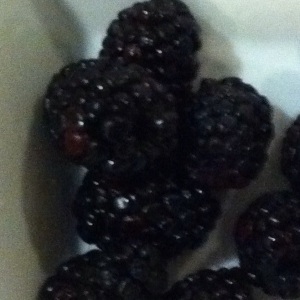We read two poems about Blackberries the other day. One by Seamus Heaney, one by Sylvia Plath. While both are dark, the latter is much darker. I did not tell them the facts of Plath’s life or how near in time the poem was written before her suicide. I will let them find that out on their own. (We try to downplay the biographical.)
Here is Heaney’s poem:
Blackberry-Picking by Seamus Heaney
Late August, given heavy rain and sun
For a full week, the blackberries would ripen.
At first, just one, a glossy purple clot
Among others, red, green, hard as a knot.
You ate that first one and its flesh was sweet
Like thickened wine: summer’s blood was in it
Leaving stains upon the tongue and lust for
Picking. Then red ones inked up and that hunger
Sent us out with milk cans, pea tins, jam-pots
Where briars scratched and wet grass bleached our boots.
Round hayfields, cornfields and potato-drills
We trekked and picked until the cans were full
Until the tinkling bottom had been covered
With green ones, and on top big dark blobs burned
Like a plate of eyes. Our hands were peppered
With thorn pricks, our palms sticky as Bluebeard’s.
We hoarded the fresh berries in the byre.
But when the bath was filled we found a fur,
A rat-grey fungus, glutting on our cache.
The juice was stinking too. Once off the bush
The fruit fermented, the sweet flesh would turn sour.
I always felt like crying. It wasn’t fair
That all the lovely canfuls smelt of rot.
Each year I hoped they’d keep, knew they would not.
And here is Heaney reading it:
What we have are the thrills and joys of nature’s bounty, of love, of lust, followed by its ultimate disappointment, and capped by the human facility to continue even with the knowledge that disappointment is almost always assured.
But that last line is hopeful despite the odds: “Each year I hoped they’d keep, knew they would not.”
* * * * * *
Hopeful is what Sylvia Plath’s poem is not! It too holds the gathering of blueberries in awe, is humbled by their abundance and their promise, but in the end there is nothing. Though that should not be a surprise. The first line itself drums in that nothingness, repeating the words “nothing,” “nothing,” “nobody.”
Nobody in the lane, and nothing, nothing but blackberries,
Blackberries on either side, though on the right mainly,
A blackberry alley, going down in hooks, and a sea
Somewhere at the end of it, heaving. Blackberries
Big as the ball of my thumb, and dumb as eyes
Ebon in the hedges, fat
With blue-red juices. These they squander on my fingers.
I had not asked for such a blood sisterhood; they must love me.
They accommodate themselves to my milkbottle, flattening their sides.
Overhead go the choughs in black, cacophonous flocks—
Bits of burnt paper wheeling in a blown sky.
Theirs is the only voice, protesting, protesting.
I do not think the sea will appear at all.
The high, green meadows are glowing, as if lit from within.
I come to one bush of berries so ripe it is a bush of flies,
Hanging their bluegreen bellies and their wing panes in a Chinese screen.
The honey-feast of the berries has stunned them; they believe in heaven.
One more hook, and the berries and bushes end.
The only thing to come now is the sea.
From between two hills a sudden wind funnels at me,
Slapping its phantom laundry in my face.
These hills are too green and sweet to have tasted salt.
I follow the sheep path between them. A last hook brings me
To the hills’ northern face, and the face is orange rock
That looks out on nothing, nothing but a great space
Of white and pewter lights, and a din like silversmiths
Beating and beating at an intractable metal.
The speaker, who is traveling downward on a path lined with blackberry bushes, believes that there is something at the end–the sea. Earlier, when she sees a swarm of flies satiated with blackberry juice she states that the flies “believe in heaven.” (Is her statement that “they believe in heaven” an implication that she does not?)
Perhaps the flies believe they have found it.
For the speaker, however, no reward awaits. The sea–to which she had looked forward to throughout her journey–is a pale wasteland. Again there is the repetition of the word “nothing”: “…that looks out on nothing, nothing but a great space” and from within this void she hears the “Beating and beating of an intractable metal.”
That ‘beating and beating” reminds me of the sea in “Dover Beach” where:
you hear the grating roar
Of pebbles which the waves draw back, and fling,
At their return, up the high strand,
Begin, and cease, and then again begin,
With tremulous cadence slow, and bring
The eternal note of sadness in.
It’s that eternal note of sadness that Plath’s speaker also hears, an empty, pale silence. After her walk, after her hoping to be loved, after her wanting a heaven, she comes to this cliff. And this is what she hears.
Perhaps we’ll do “Dover Beach” next.

